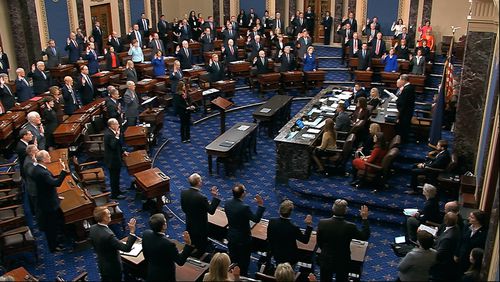Opening arguments have yet to be concluded, but we know that the impeachment trial of President Donald J. Trump is all but certain to end in an acquittal.
We are told this by the most reliable of sources — the very jurors who are sworn to do “impartial justice according to the Constitution.” Well in advance of any formal presentation of evidence, many Republicans in the U.S. Senate — David Perdue and Kelly Loeffler of Georgia among them – had concluded that the president should skate.
"My personal preference…would be to see this thing dismissed out of hand," Perdue said last weekend.
It won’t be that quick, but when it does happen, the trial of Donald Trump will end as one of the most famous cases of jury nullification on record. As a body, the Senate will reach a verdict of acquittal by setting aside or simply ignoring the facts of the case.
Jury nullification is a practice with a long history on this continent — some of it noble. But not all of it.
First, let me admit that a trial in the U.S. Senate and a criminal proceeding at your local courthouse make for an imperfect match. Unlike senators, members of courthouse juries do not decide what evidence they will consider, and what is best left unseen. Nor can Georgia juries overrule a judge’s ruling with a majority vote.
Senators can’t be struck from the jury pool for prejudicial attitudes. Courthouse jurors don’t run to cable news shows during recesses. And in courthouse trials, most defendants can’t keep evidence under lock and key by citing executive privilege.
Yet there is an important similarity when it comes to nullification. In an impeachment trial, senators are in command of both the evidence and all interpretation of the Constitution. According to our state constitution, Georgia juries “shall be the judges of the law and the facts.”
After some thought, I came up with this jackleg definition of jury nullification: Cases in which the sentiments of a jury supersede the weight of the facts.
I showed it off to Walter Olson, a senior fellow at the Cato Institute, a libertarian think tank. He was not impressed. "Usually, nullification hinges on the jury's power to ignore the law in the direction of lenience," he said. "Jurors aren't considered expert enough to second-guess what the law is, but they can appropriately take a human view of whether the law can be enforced consistent with justice. Because everyone is entitled to that."
That definition of nullification, with its focus on unjust laws, works in many cases – the best ones. Every student of journalism learns about John Peter Zenger, who in 1735 was accused of publishing seditious newspapers by the royal governor of New York. The jury was admonished to decide only whether Zenger published the newspapers. The court would decide whether the content was libelous.
The jury found Zenger not guilty of publishing the newspapers – despite overwhelming evidence that he did just that.
Defenders of nullification also point to the mid-1800s, when northern juries acquitted those accused of helping escapees from southern plantations – in violation of the Fugitive Slave Act.
In modern Georgia, attorney Catherine Bernard has earned a reputation for jury nullification when it comes to the state’s marijuana laws. Three times she has won acquittals for defendants, arguing that they were harming no one, and were using the plant to deal with personal pain.
“I have not had a prosecutor try a marijuana case with me since then. They’ve been dismissing every single one,” Bernard said. “I like to think that the prosecutors are just coming around to common sense — and their responsibility to not waste Georgia taxpayers’ money on things that don’t help public safety. Call me an optimist.”
Bernard doesn’t actually use the phrase “jury nullification” in the courtroom. Judges don’t like it.
Because juries aren’t always targeting laws they consider unjust. Sometimes they are out to nullify inconvenient facts. In 1955, 14-year-old Emmett Till, a black visitor to Mississippi, was brutally beaten and drowned for allegedly flirting with a white woman.
The two men accused of his murder were acquitted by a jury of 12 white male jurors who deliberated for an entire hour – for appearances’ sake. It certainly wasn’t the first time such a thing happened in the Jim Crow South, and it wouldn’t be the last.
Many consider the 1995 acquittal of O.J. Simpson, the African-American celebrity accused of slaying his ex-wife and a friend, as a case of jury nullification — a protest against the treatment of black men at the hands of police. Only three years earlier, riots had followed the acquittal of Los Angeles police officers accused of the videotaped beating of Rodney King. The event was still fresh in many minds when the Simpson verdict was rendered.
The coming result in Washington might be considered a case of jury nullification in the name of extreme self-interest. Perhaps like putting the sole owner of a factory, the only source of employment in a community, on trial for criminal negligence after an accident.
Convict him, and the town goes under.
With November looming, and President Trump so closely identified with the Republican base, conviction by a GOP-controlled Senate would be something close to suicide. So acquittal is a given. The thing to watch for is whether every Republican senator will nullify every fact in the case.
About the Author








